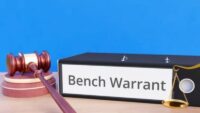Being on probation can be quite stressful already. But if you’ve somehow broken your probation terms and think that your officer may have put a warrant for your arrest, it can take quite a toll.
However, the worst thing to do in this situation is to panic and sit by. Either there really is a warrant, and you’ll be eventually arrested, or there isn’t, and you’ll still live with the constant fear of being apprehended.
Instead, you should first check if that warrant exists in the first place. And if it does, it’s time to talk to your attorney and follow up on the warrant. So keep reading for more information to get you through this tedious endeavor.
The Short Answer
The fastest and easiest way to know if there are any outgoing warrants during your probation period is to search a reliable online database. However, avoid fishy websites because you’d trust them with your personal info, such as full name, city, and state.
Alternatively, you could call or visit your nearest police department, sheriff’s office, or even the district court, the latter of which has a broader database than the former two.
In any case, if you find a probation violation warrant, you’ll definitely need your lawyer to help you take correct legal measures and ensure the best outcome for your situation.
What Is a Probation Warrant?
A probation warrant, or probation violation warrant, is a type of bench warrant. And by bench, the warrant refers to where the judge sits.
Bench warrants, and by extension, probation warrants, are similar to arrest warrants in that the police will arrest you.
But unlike arrest warrants, which originate from law enforcement officers against lawbreakers, bench warrants are issued directly by a judge against those who break the court’s rules or otherwise show contempt of court.
For probation violation warrants, these rules are the probation terms you agreed to before being released under supervision. If your probation officer finds out or suspects that you’ve broken your probation terms, they present evidence to the judge, who will issue a warrant if all is solid.
Why Would I Have a Probation Warrant?
Before the authorities release you on probation, you’ll have to agree to some terms. For example, drug offenders may be forced to undergo rehab, while DUI offenders can be barred from driving.
Some other regular probation terms are community service, fines, alcohol restriction, inability to leave the county or state, and regular meetings with your probation officer.
And if you break one of these terms, whether intentionally or accidentally, you’ll likely have a probation warrant filed against you within a day or two of the mishap.
In many cases, it’s easy to unknowingly slip and break one of the terms. For example, maybe you’ve been busy and missed a court date or a meeting with your officer. Or perhaps you’ve had a little more alcohol than your terms allow.
Checking if There’s a Probation Warrant on Me
When the court issues a warrant, they don’t notify the wanted person to prevent them from evading or hiding items of interest. But instead of waiting for a notification, you can actively look for the warrant through a few methods instead.
Online Background Check
Since most criminal records are public in the USA, you can search on the internet instead of calling your local police department or court. The easiest way to do this is by visiting a reliable warrant database and looking up your name, city, and state.
Contact the Authorities
Another option is to inquire directly from the authorities – those can be your local police department, which has a database of the jurisdiction it serves, or the district court, which has a bigger database.
There’s a catch, though. They won’t tell you if there’s a warrant or not over the phone, so you’ll have to visit them in person. Of course, that means you’ll be arrested on the spot if there’s a warrant, which is inconvenient if you’re not prepared to turn yourself in.
You can ask someone you trust, such as a close friend or relative, to inquire about it for you. But it’s better to hire an attorney since they’ll know how to approach this situation correctly, especially if the police ask them about you.
There’s a Warrant – Now What?
If you’ve confirmed that there’s a probation violation warrant, you’ll likely eventually be caught. But instead of waiting and panicking, it’s better to take some measures.
Hire an Attorney
We can’t stress this enough. Even if you think you can handle the hearing on your own, a good defense attorney can help you tremendously through the following hassle to ensure you get the best outcome.
For instance, your attorney can argue that your violation was minor or accidental and can help you get released again on a good bail deal.
Will the Police Come After Me?
Probation violation warrants are significantly less severe than most warrants in the police database. As such, they end up with a much lower priority than felony arrest warrants and other serious matters.
So it’s unlikely that the police will actively search for you or anyone else with a probation warrant, especially if it’s a misdemeanor.
However, you’ll likely be apprehended on your next encounter with the police, whether through a traffic stop, a meeting with your probation officer, or else.
Turn Yourself In
Instead of waiting for the police to catch you eventually, it’s better to turn yourself in on your terms and be done with the matter as soon as possible.
We know how hard it is to give up your own freedom voluntarily. However, those who turn themselves in are significantly more likely to get released again since they show themselves as willing to go through with their probation terms.
Related Posts
 How Long Does a Background Check Take for an Apartment?
How Long Does a Background Check Take for an Apartment? How Long Does a DoorDash Background Check Take
How Long Does a DoorDash Background Check Take![Best Free Background Check Sites [Our Reviews and Comparisons]](https://backgroundhawk.com/wp-content/uploads/2021/02/Best-Free-Background-Check-Sites-min-150x150.jpg) Best Free Background Check Sites [Our Reviews and Comparisons]
Best Free Background Check Sites [Our Reviews and Comparisons] Why Is My Background Check Taking So Long?
Why Is My Background Check Taking So Long? How Long Does a Background Check Take for a Government Job?
How Long Does a Background Check Take for a Government Job? How Long Does It Take to Get Fingerprinted?
How Long Does It Take to Get Fingerprinted? How Do You Know if You Have a Secret Indictment?
How Do You Know if You Have a Secret Indictment? Checkr Background Checks Review
Checkr Background Checks Review What Is a Capias Warrant
What Is a Capias Warrant Will Changing Your Date of Birth Pass a Background Check?
Will Changing Your Date of Birth Pass a Background Check?

